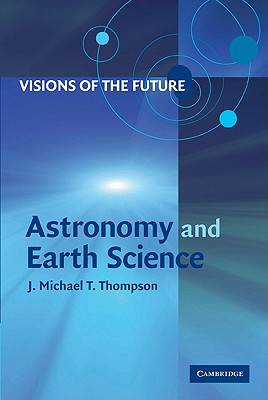
- Retrait gratuit dans votre magasin Club
- 7.000.000 titres dans notre catalogue
- Payer en toute sécurité
- Toujours un magasin près de chez vous
- Retrait gratuit dans votre magasin Club
- 7.000.0000 titres dans notre catalogue
- Payer en toute sécurité
- Toujours un magasin près de chez vous
67,45 €
+ 134 points
Description
What does the future of science hold? Who is making the discoveries that will help shape this future? What areas of research show the greatest promise? Find definitive and insightful answers to such questions as these in the three volumes of Visions of the Future: Astronomy and Earth Science, Chemistry and Life Science, and Physics and Electronics. Representing a careful selection of authoritative articles published in a special issue of Philosophical Transactions--the world's longest-running scientific journal--the chapters explore such themes as: The Big Bang Humankind's exploration of the solar system The deep interior of the Earth Global warming and climate change Atoms and molecules in motion New materials and processes Nature's secrets of biological growth and form Understanding the human body and mind Quantum physics and its relationship to relativity theory and human consciousness Exotic quantum computing and data storage Telecommunications and the Internet Written by leading young scientists, the timely contributions convey the excitement and enthusiasm that they have for their research and a preview of future research directions. J.M.T. Thompson is Professor of Nonlinear Dynamics and Director of the Center for Nonlinear Dynamics at University College London. Professor Thompson has published widely on instabilities, bifurcations, catastrophe theory and chaos. He was a Senior SERC Fellow, served on the IMA Council, and, in 1985, was awarded the Ewing Medal of the Institution of Civil Engineers. Currently, he is the Editor of the Royal Society's Philosophical Transactions (Series A) which is the world's longest running scientific journal.
Spécifications
Parties prenantes
- Auteur(s) :
- Editeur:
Contenu
- Nombre de pages :
- 246
- Langue:
- Anglais
Caractéristiques
- EAN:
- 9780521805377
- Date de parution :
- 02-07-01
- Format:
- Livre broché
- Format numérique:
- Trade paperback (VS)
- Dimensions :
- 133 mm x 207 mm
- Poids :
- 426 g

Les avis
Nous publions uniquement les avis qui respectent les conditions requises. Consultez nos conditions pour les avis.






